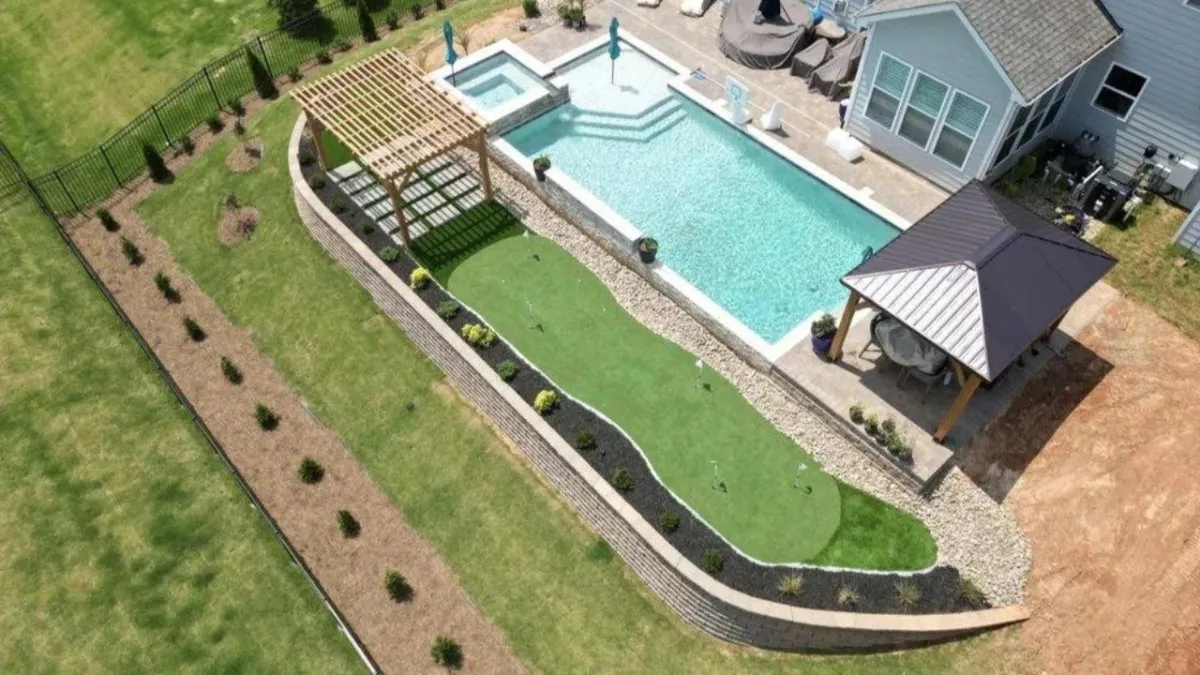Blogs

Types of Landscaping & Difference Between It and Design
Landscaping includes various styles like formal (symmetrical designs), informal (natural curves), woodland (forest-like), contemporary (clean lines), modern (minimalist), low maintenance (easy upkeep), and drought-tolerant (water-efficient). While landscaping involves enhancing outdoor spaces through gardening and hardscaping, landscape design focuses on planning and arranging elements for aesthetic and functional purposes.
Landscaping is more than just planting flowers or maintaining a lawn; it’s a comprehensive approach to enhancing outdoor spaces. Whether you prefer structured elegance or a casual natural vibe, the types of landscaping offer solutions for various preferences.
Additionally, understanding the distinction between landscaping and landscape design can help clarify your vision for your property. At Greystone Hardscapes, we specialize in creating outdoor spaces tailored to your needs, combining artistry and functionality to elevate your landscape.
Key Takeaways
Landscaping includes various styles like formal, informal, woodland, and more.
Formal landscaping prioritizes symmetry and order, while informal landscaping has a natural feel.
Woodland and drought-tolerant landscapes are great for eco-friendly, low-maintenance solutions.
Landscaping refers to physical modifications, while landscape design involves detailed planning.
Types of Landscaping
Landscaping comes in diverse styles, each offering unique benefits and aesthetics tailored to different needs and environments. From structured formal designs to eco-friendly drought-tolerant landscapes, here’s a breakdown of popular types to inspire your outdoor space:
1. Formal Landscape
Characterized by symmetry and precision, formal landscapes feature meticulously arranged plants and geometric patterns, providing a polished, elegant look. This type of landscaping requires consistent upkeep to maintain its structured appeal.
Symmetrical layouts
Geometric patterns and pathways
High-maintenance style
2. Informal Landscape
Relaxed and organic, informal landscaping uses curved lines and natural groupings to create a welcoming, cozy environment. It’s perfect for residential settings that value a casual, homey atmosphere.
Curved, natural pathways
Irregular plant arrangements
Low-pressure maintenance
3. Woodland Landscape
This style mimics the beauty of natural forests with native plants and trees, creating a serene, eco-friendly atmosphere. It’s ideal for low-maintenance enthusiasts and nature lovers.
Native plants and trees
Seamless integration with nature
Minimal upkeep required
4. Contemporary Landscape
Blending natural and modern elements, contemporary landscapes highlight clean lines and balanced aesthetics. Ideal for urban or suburban homes seeking a stylish yet approachable outdoor space.
Clean lines and natural materials
Mix of hardscape and softscape
Focus on simplicity and elegance
5. Modern Landscape
Minimalist and sleek, modern landscaping features geometric shapes, orderly plant arrangements, and industrial materials for a chic and functional outdoor area.
Simple, geometric designs
Use of metal, concrete, and stone
Highly functional, low-clutter spaces
6. Low-Maintenance Landscape
Designed for convenience, this type integrates resilient plants, automated systems, and functional elements to reduce upkeep while maintaining an attractive appearance.
Low-maintenance greenery
Automated irrigation systems
Functional, user-friendly features
7. Drought-Tolerant Landscape
This eco-conscious style is tailored for water conservation, using drought-resistant plants, gravel, and efficient irrigation methods. Perfect for arid regions or eco-friendly homeowners.
Native or drought-resistant plants
Gravel and rock features
Water-efficient systems like drip irrigation
Difference Between Landscaping and Landscape Design
While often used interchangeably, landscaping and landscape design represent distinct phases of creating outdoor spaces. Landscaping involves physical execution, while landscape design is the planning process that brings the vision to life. Here's a closer look:
Landscaping
Landscaping focuses on physically transforming the land through installation and maintenance. It involves everything from planting greenery to constructing hardscapes and incorporating natural features like ponds or fountains.
Planting trees, shrubs, and flowers
Installing hardscapes (patios, walkways)
Adding water features and lighting
Ongoing maintenance and upkeep
Landscape Design
Landscape design emphasizes creating a comprehensive plan for the outdoor space, blending aesthetics with functionality. It considers various factors like soil type, climate, and layout to achieve the desired look and usability.
Detailed planning and sketches
Incorporating softscape (plants) and hardscape (structures)
Factoring in soil, climate, and drainage
Visualizing aesthetics and spatial organization
How to Choose the Right Landscaping Style for Your Home
Selecting the right landscaping style ensures harmony between your home’s architecture and outdoor space. Consider factors like maintenance, climate, and your personal preferences to create a design that enhances functionality and aesthetics.
Reflect on personal taste and lifestyle
Match landscaping style with property architecture
Evaluate climate and local plant options
Decide between high- or low-maintenance designs
Focus on outdoor space usability
Benefits of Professional Landscape Design
Professional landscape design offers a strategic approach to creating outdoor spaces that are both functional and visually appealing. It combines expertise with creativity, resulting in efficient, sustainable, and cohesive solutions for your home.
Maximizes use of small or awkward spaces
Selects plants suited to soil and climate
Saves time and reduces costly errors
Creates a cohesive balance between softscape and hardscape
Enhances property value and curb appeal
Common Mistakes in Landscaping and How to Avoid Them
Landscaping mistakes can lead to costly repairs and inefficient spaces. Proper planning, attention to detail, and expert guidance can help avoid these common pitfalls and ensure a thriving outdoor area.
Poor plant selection (e.g., invasive species)
Neglecting drainage systems
Overcrowding plants or poor spacing
Ignoring maintenance needs
Skipping professional consultations for complex designs
Hardscaping vs. Landscaping: What’s the Difference?
While both hardscaping and landscaping contribute to a balanced outdoor environment, their focus differs. Hardscaping centers on structural elements, while landscaping prioritizes plants and natural features. Together, they create functional and beautiful outdoor spaces.
Hardscaping: Includes patios, pathways, retaining walls, and fences
Landscaping: Focuses on lawns, trees, flowers, and water features
Hardscaping provides structure; landscaping adds life and vibrancy
Both require thoughtful integration for a cohesive design
Essential for creating usable, visually appealing outdoor areas
Frequently Asked Questions About Landscaping
1. What is landscaping?
Landscaping involves modifying outdoor spaces with plants, structures, and natural elements to improve aesthetics and functionality.
2. How does landscape design differ from landscaping?
Landscape design is the planning phase, while landscaping is the execution of those plans.
3. What is hardscaping?
Hardscaping includes non-living elements like patios, retaining walls, and pathways that complement the natural features of a landscape.
Contact Us for Landscaping Services in Charlotte NC Today!
Ready to elevate your outdoor space? At Greystone Hardscapes, we specialize in custom landscaping solutions, including paver patios, retaining walls, and outdoor kitchens. Serving Matthews, Charlotte, and beyond, contact us today for a free quote and exceptional results!
You Dream It.
We Build It.
Superior Craftmanship.
Every Time.
Hardscape Services:
Copyright © Greystone Hardscapes Inc. 2025. All Rights Reserved. Privacy Policy. Terms & Conditions. Web Design by Fused Media


